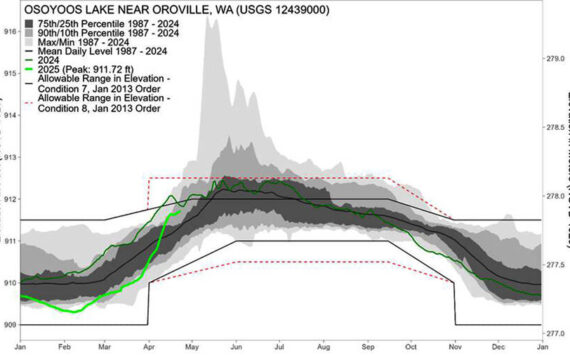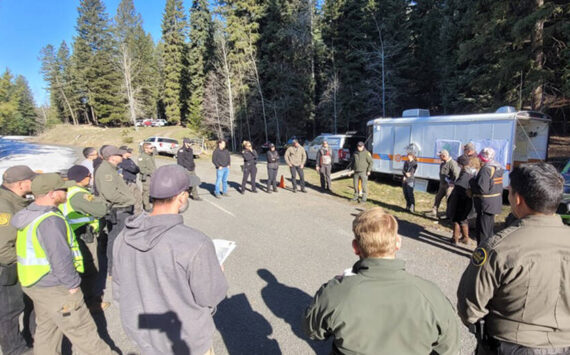Dear Editor,
A few words about the recent Canada, United States trans-border Osoyoos Lake Water Science Forum in British Columbia Canada.
A meeting such as this certainly provides an avenue for speeches and presentations about climate change, sustainable fisheries, pollution and fresh water scarcity. But such an event, commendable though it was for addressing symptoms of problems and allowing individual constituencies to promote tax transfers under the banner of “worthy causes,” only diverts society’s attention away from the real issue, which is political and governmental failure and a lack of accountability with respect to the cause of the water problem itself. (The catering, I should add, was excellent.)
“Woolgathering” sessions such as this one (no offense to the sheep farmers, I hope) can and will continue until hell freezes over, but they will not contribute much to the cure or mitigation of the underlying disease. Nor will they cure the systemic faults in our political-economic system or in government, which, remaining unaddressed, allow a further escalation toward social, economic and environmental adversity, ultimately causing irreparable harm to society.
Let us remember that while water covers 70 percent of the globe, only 3 percent is fresh water, and only a fraction of that supports life on the land. Amplify that overwhelming reality by implanting it within the semi-arid eco-system of the Okanagan, and one should readily be able to see that sustainable economic development and employment in this region hang by a thread. Managing the water resources that we have is of critical importance.
To place the issue in another broader context, we might remember that earthquakes, floods, or drought, for example, are acts of nature. On the other hand, the lack of sustainable economic development, the reduced prospects for employment that follow, and the social adversity that ensues –- all of these are not acts of nature but are of our own doing. Lest we forget, in a democracy, it is the voters who have the responsibility for curbing greed and bad policy, and ultimately government failure. Ignorant and complacent voters are what we must fear. For as Churchill put it: “The best argument against democracy is a five-minute conversation with the average voter.”
My own research focuses on the “allocation mechanism” and its faults. The political-economic system, which the United States implemented in its Constitution in 1788, allocates resources through a mix of capitalism and socialism. It allows for the profit motive in the pursuit of personal happiness, while also allowing for a degree of collectivism and planning for the betterment of the society. At its root, it allows freedom of expression, personal and academic, to increase understanding and for the betterment of society. The mixed monetary economies of Canada, Sweden, Israel, and others follow from this model. My intellectual hero, Churchill, once again, pithily called democracy “the worst form of government, except for all the other forms that have been tried from time to time.”
I have studied the private sector in the Okanagan as well as First Nation variants, for a very long time. We must realize that sustainable social satisfaction and political stability depend upon sustainable economic production and ultimately upon relevant research in our universities. It is justifiable that the society that makes up the Canadian Okanagan and U.S. Okanogan should ask whether their universities are doing the proper research to increase needed understanding and to do that research at an early enough stage to develop the methods, systems, and policies with respect to, for example, the municipal structures, and taxation and appeal rules that society needs in order to thrive, as it faces the challenges of the future.
It matters what kind of research objectives universities prioritize and reflect ethical value, hark back to the Copernicus University Charter for Sustainable Development that obligates universities to cooperate internationally toward sustainable development in an ethically responsible manner. The charter not only concern the routine direction of research relating generally to sustainable development, but to making an ethical commitment to this objective.
I suggest that it is urgent for the University of British Columbia Okanagan and Washington State University, in cooperation, to invite the local populations to participate in a conversation to address the following topic: “What kind of society do the constituents of the Okanagan want for their children and grandchildren?” Only a future-focused forum of this sort, with some guidance from skilled and thoughtful academics, has any hope of reaching any sort of viable guidelines for improving our shared economic and social environment.
The above suggestion comes with recognition that national economies are made up of local and regional economies; and that investment decisions to foster sustainable economic production are not made in government offices in Washington or Ottawa but rather in local and regional economies across the country.
May I also say, parenthetically, that when many levels of government operate within overlapping local and regional jurisdictions that the risk is increased that “nobody is ultimately responsible?” (Just to add an extra helping of mashed potatoes to an otherwise already difficult to digest meal).
I further suggest that the societies on both sides of the border, in British Columbia and Washington State, promote the revitalization of the Canada, Sweden, United States IISRE research initiative (“the International Institute for Sustainable Regional Economies”). This Initiative, of which I am a founding participant, performs necessary research directed toward increased understanding about systemic issues that hamper investment in sustainable economic production and employment in regional economies such as the Okanagan and Okanogan watersheds, as well as in Sweden and beyond.
It is essential that local and regional governments meet their responsibilities. Their area of responsibility is not and cannot be the private sector’s. Lest we again forget: the political/economic system fostered after the American Revolution, relies on an effective government to curb private sector excesses – witness the 2008 collapse – which, if left unaddressed, tanks the economy and turns social satisfaction on its head.
Ultimately, I’m not holding my breath that the social and political establishment, including First Nations, will put political bias and self-interest aside and focus on issues that really matter to the survival of democracy, humanity and our grandchildren’s future. I can only suggest.
Kell Petersen
Osoyoos, BC





